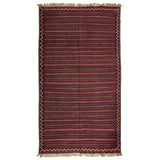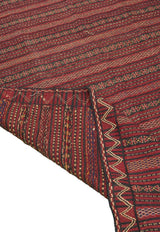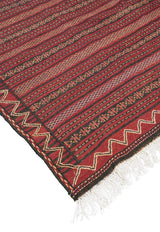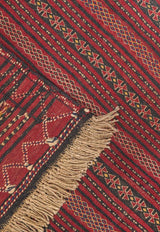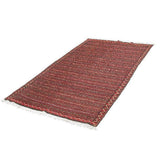Art Monkey
Moharamat Nomadic Khorasan Persian Kilim 175x315
The nomadic Khorasan Persian Kilim is a handcrafted flat-weave rug featuring intricate patterns and rich cultural symbolism, reflecting the nomadic traditions of northeastern Iran
PRODUCT DESCRIPTION
| Kind: Kilim |
| Design:Moharamat Nomadic |
| Material: Wool with plant-based dye |
| Origin: Khorasan |
| Color: Red |
|
Width: 175 cm Length: 315 cm Area: 551 cm |
| Shipping: Free delivery in UAE within 7 business days |
More information
This Persian Kilim is a handwoven flat-weave rug crafted by the nomadic tribes of the Khorasan region in northeastern Iran.
These kilims are celebrated for their intricate geometric patterns, cultural symbolism, and traditional craftsmanship. Kilims from Khorasan stand out for their lightness, flexibility, and versatility, making them practical and decorative pieces that carry centuries of nomadic heritage.
key characteristics of Nomadic Khorasan Persian Kilim
Weaving Technique
- Flat-Weave (Kilim Style): Unlike knotted rugs with a pile, the nomadic Khorasan Persian Kilim uses a flat-weaving technique, creating a thinner, more flexible rug. This technique involves weaving horizontal weft threads tightly through vertical warp threads, resulting in a smooth surface without the plush texture of piled carpets.
- Geometric Patterns: The design of the nomadic Khorasan Persian Kilim often features repetitive geometric shapes like diamonds, zigzags, and medallions. These patterns are traditional to nomadic tribes and hold symbolic meanings related to nature, life, and tribal identity.
- Symmetry: Many kilims from Khorasan showcase symmetrical designs with a central motif framed by decorative borders, which is a hallmark of nomadic weaving traditions.
Materials
- Wool: High-quality wool is the primary material used in the Nomadic Khorasan Persian Kilim, sourced from local sheep herded by nomadic tribes. The wool provides durability, warmth, and a soft texture, making the kilim suitable for both floor coverings and decorative use.
- Natural Dyes: The colors in a nomadic Khorasan Persian Kilim are derived from natural dyes obtained from plants, minerals, and insects. These dyes create deep, earthy tones, including rich reds, browns, blues, and blacks, which are fade-resistant and grow more beautiful with age.
Design Elements
- Geometric and Tribal Motifs: The designs on the nomadic Persian Kilim often reflect tribal traditions and nomadic life. Common motifs include stars, animals, trees, and abstract shapes that represent various aspects of life and nature.
- Rich Color Palette: The kilims typically use a color palette of muted, earthy tones, with shades like deep reds, dark blues, and browns. Occasionally, lighter or brighter accents, such as creams, yellows, or oranges, may be added to highlight specific motifs.
- Borders: The kilim’s borders often feature intricate designs that frame the central pattern, enhancing the symmetry and aesthetic appeal of the rug.
Size and Portability
-
Varied Sizes: The Nomadic Khorasan Persian Kilim is available in a range of sizes, from small, portable pieces to larger rugs. Smaller kilims are especially practical for nomadic tribes, as they are easy to transport and serve multiple functions.
- Portable and Flexible: Due to its flat-weave construction,this Persian Kilim is lightweight and flexible, making it ideal for use in various settings, such as floor coverings, wall hangings, or tent decorations.
Functionality
- Multi-Purpose: Traditionally, the nomadic Khorasan Persian Kilim served multiple purposes, from floor coverings to tent wall hangings or even bedding. In modern homes, they can be used as rugs, decorative throws, or wall art.
- Durability: Despite its flat weave, the nomadic Khorasan Persian Kilim is highly durable. The tightly woven wool fibers and sturdy construction make it suitable for high-traffic areas, offering a long-lasting, practical solution for both decorative and functional purposes.
Cultural Significance
- Nomadic Heritage: This Khorasan Persian kilim reflects the nomadic traditions and lifestyle of the tribes from northeastern Iran. Each kilim tells a story through its motifs, colors, and patterns, representing the identity, beliefs, and experiences of the weaver and the tribe.
- Generational Craftsmanship: The art of weaving the Khorasan Persian Kilim is passed down through generations, with each piece serving as a unique expression of the tribe’s cultural heritage. The weaving process is often a communal effort, involving the entire tribe in the creation of these intricate textiles.
Uses in Modern Interiors
The nomadic Khorasan Persian Kilim is a beautiful blend of traditional artistry, cultural heritage, and practical functionality. Its flat-weave design, intricate patterns, and natural color palette make it a versatile addition to any home, whether used as a functional rug or a decorative piece.
Steeped in the traditions of nomadic life, this kilim carries the stories and symbols of its makers, making it not just a carpet, but a cultural artifact treasured by collectors and art enthusiasts alike.
Note: For more detailed images and videos of this kilim please contact us directly.View the full collection here
CARE
Vacuum regularly to extend your rug’s life.
Air it out to help prevent moisture buildup.
Rotate to distribute wear and fading.
Avoid excessive sunlight to prevent fading.
Clean spills immediately to minimize damage.
Use under-rug padding for multiple benefits.
Be mindful of furniture placement.
Supervise pets around the rug.
Call the pros for occasional deep cleans.

